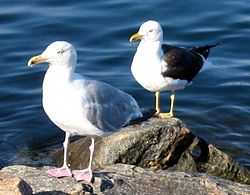***
Boken "Terraforming" är tvåspråkig, bläddrar man från ena hållet får man engelska, annars svenska.
Processen går över 300 år och Johannes Heldén har delat in utvecklingen i sju perioder, några längre och några kortare.
Den första tidseran, "Ecopoiesis", sträcker sig över 125 år. Ordet ecopoiesis betyder "artificiellt skapande av ett hållbart ekosystem på en livlös planet". Just den första delen fick jag inte riktigt kläm på, men sen blir det intressantare.
Varje period inleds med en beskrivning av vad som hänt i utvecklingen och sen följer "diktmassan".
Andra perioden kallar han "Protein" som även den sträcker sig över 125 år, och då utvecklas molnformationerna, samt mineraler som förvandlas till ett sorts salt. Ur dikten från Protein hämtar jag följande exempel:
 (Ur Terraforming, av Johannes Heldén. Stockholm : OEI Editör, 2013.)
(Ur Terraforming, av Johannes Heldén. Stockholm : OEI Editör, 2013.)(...)
ett övervuxet fundament
en bronsplakett, Jupiters andra måne.
fiberoptik under en smutsig plexiglaslucka.
glider över i ett mer abstrakt något
partier förfaller och går bara att återuppliva delvis mellan
fragment, mellan lamporna på elljusspåret, mellan ljus-öarna
"Hjärnan en bild av universum"
eller var det tvärtom inneslutet i grönskimrande glas
böjde sig och tog upp den i handen, ett mjölkvitt öga
öppnades, tittade på honom. Näbben öppnades och stängdes,
öppnades
stängdes
(kylskåpet slutar surra, ordet firefly) öppnades
öppnade
framtida arkipelager nu är det över
över tröjan fåglarna Låsta i formationer
amino protonuklein kedjor låsta sekvenser
- maskiner i röd rost. På fält,
under en tunn himmel maskiner som har med skörd eller
Elektricitet
att göra
"Humans have demonstrated the technology to warm the Earth by a few degrees using greenhouse gases." redan på väg ut ur språket
oväder över synvillor det oblåsta glaset fortfarande orange i
kanterna. kol kisel
**
Under tredje perioden, Capillatus, faller de första vattendropparna och i den fuktiga askan får mossan fäste.
Därefter följer en tvåårig regnperiod. Jag återger den inledande beskrivningen för den är vackert formulerad.
(Ur Terraforming, av Johannes Heldén. Stockholm : OEI Editör, 2013.)
"I. Låg elektrisk spänning i vattendragen, ryckningar i en odefinierad kropp, före eller efter en större händelse. Ruttnande sjok med biomassa i strandkanterna. Kilometerbrett pollenstråk längre ut, blekgult. Stillastående mineraler. Näringsmättat, opakt med rosa detaljer. Längre ut guppar något stilla, upplöst i kanterna. Fettberg utmed eroderade stränder, glänsande skälvande näring, suckar och visslingar ur hålor när luften flyr ut.
II. Vi har slungat ut namn mot en blek röd punkt. (Vidder. Konturlinje.) Döper platser efter tidigare platser. Smältvattnet fyller långsamt upp låglandet i söder, ett vidsträckt, grunt hav. Det skulle gå att vada tvärs över det, men det skulle ta dagar, veckor. Övernatta stående. Nätterna först svarta, tysta. Sedan mörkgrå, lätt väsande av vind. Dagarnas hetta, enkelt existerande, blir något komplext, uppdelat i sektioner av varierande ljus, fuktighet, molntäcke. Sydsidorna av massiven putsade av vinden, konturerna vaga, här och där berget våldsamt klyvt av mineralådror som reflekterar ljus. På håll ser de ut som stelnade blixtar."
**
Liksom hans andra böcker väcker läsningen många frågor. Vissa avsnitt är svårare att greppa än andra. Men det är ett intressant verk/projekt.





















